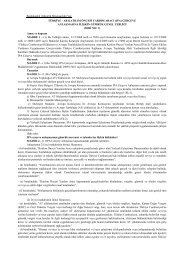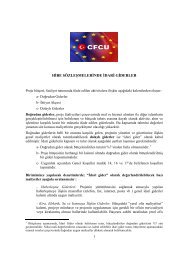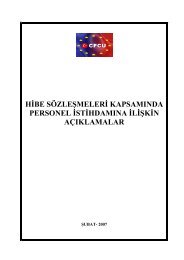Project Cycle Management Training Handbook - CFCU
Project Cycle Management Training Handbook - CFCU
Project Cycle Management Training Handbook - CFCU
Create successful ePaper yourself
Turn your PDF publications into a flip-book with our unique Google optimized e-Paper software.
<strong>Project</strong> <strong>Cycle</strong> <strong>Management</strong> <strong>Training</strong> <strong>Handbook</strong><br />
Chapter 5 Using the LFA to Assess <strong>Project</strong> Proposals<br />
Has the right<br />
information been<br />
provided?<br />
This Chapter explains how the Logical Framework Approach can be<br />
used to assess a project proposal in order to identify weaknesses in<br />
project design, and to formulate questions for preparatory studies. It<br />
also provides guidance for assessing the quality of a Financing<br />
Proposal.<br />
5.1 Introduction<br />
During the preparatory phases of the project cycle, the Logical<br />
Framework Approach is primarily intended as a participatory<br />
planning tool. However, it is also a powerful tool for ex-post analysis<br />
of project proposals, the only difference being that the source of<br />
information for problems is the project proposal rather than primary<br />
data sources such as interviews, surveys, reports and statistics.<br />
The purpose of applying the LFA to a proposal is to identify<br />
weaknesses or gaps in the project’s design. These gaps will relate to<br />
the RELEVANCE, FEASIBILITY or SUSTAINABILITY of the<br />
project, and will have to be addressed through the conduct of<br />
additional studies, or from existing sources. It is important to note<br />
though that the technique merely assists in the desk study of an<br />
existing proposal, and in no way substitutes for the participatory<br />
planning approach that is central to the sound application of the LFA.<br />
The PCM training programme offers two tools for assessing project<br />
proposals:<br />
� The Guide for Assessment of a <strong>Project</strong> Proposal, which is<br />
intended for in-depth analysis of project proposals prior to the<br />
formulation phase. Its purpose is to assist in the identification of<br />
key questions and issues for inclusion in terms of reference for<br />
feasibility studies.<br />
� The Quality Assessment Tool, which is intended for quality<br />
checking of draft financing proposals prior to their submission to<br />
the relevant financing committee.<br />
43





